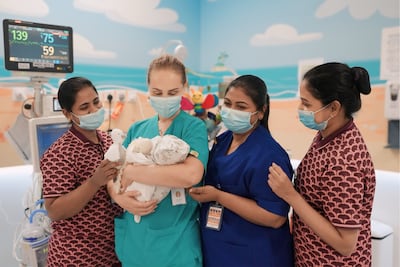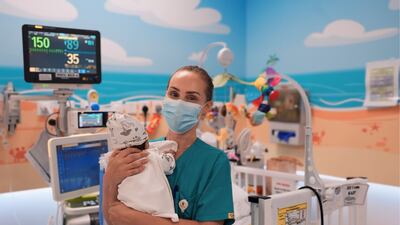Baby Saif has undergone a series of complex medical procedures, including surgery while still in his mother's womb, after a 12-week scan revealed he had a severe defect in his diaphragm.
But, following a 135-day stay in the neonatal intensive care unit at Burjeel Medical City in Abu Dhabi, Saif is ready to go home.
Latifa and her husband, an Emirati couple from Al Ain, were ecstatic when they learnt they were expecting their first child through IVF, after five years of marriage.
However, a 12-week pregnancy scan in November detected the serious diaphragmatic defect, which was causing Saif's bowel and liver to protrude into the thorax, the area of the body between the neck and the abdomen.
A congenital diaphragmatic hernia (CDH) is a rare condition that occurs when the diaphragm – the muscle that separates the chest from the abdomen – fails to close during prenatal development.
This allows abdominal organs such as the stomach, intestines and liver to move into the chest.
When the abdominal organs are in the chest, they can crowd the heart and lungs and keep the lungs from growing normally.
“It was crushing,” Latifa told The National, recalling the moment she heard the diagnosis.
“I was never going to give up on him and was willing to accept whatever God had planned for him, but it was a difficult journey. It does still feel like a dream.”
Latifa was advised to give birth at a government hospital in Abu Dhabi and later move her son to a specialist paediatric hospital for the required surgery
However, she decided against taking any risks with Saif's care.
“I had a friend whose baby also had CDH and her son died while being taken by ambulance to another hospital, so I wasn’t willing to take any risks.”
The couple sought out specialists and consulted Dr Mandeep Singh, consultant in foetal maternal medicine and obstetrics at Kypros Nicolaides Fetal Medicine and Therapy Center at Burjeel Medical City.
“As the pregnancy advanced, it was clear that the defect was severe, and this had led to both lungs being severely compressed,” Dr Singh said.
“The chances of the baby surviving with such a serious defect are around 10-15 per cent.
“Their only hope was to undergo a complex in-utero procedure called the Feto procedure (foetal endotracheal occlusion), in which a balloon is placed in the baby’s trachea using a fetoscope to encourage lung growth.”

Overcoming challenges
At 27 weeks' gestation, the first surgery was carried out, the Feto procedure at Burjeel Medical City.
Four days later, Latifa began bleeding and losing amniotic fluid. She remained hospitalised until her delivery in March.
“Honestly, the care I received here is like nothing else. I had the entire medical team checking on me every day,” she said.
At 32 weeks, Latifa went into labour, and the medical team performed the second surgery, a specialised operation known as Exit (ex-utero intrapartum treatment), allowing the baby to be partially delivered while still attached to the placenta.
This procedure provided Saif with oxygen from his mother as the medical team stabilised his breathing before delivery.
Dr Irfan Basha burst the balloon in Saif's trachea and inserted a tube to help him breathe. The baby was then delivered and transferred to the neonatal intensive care unit, where he underwent another major operation, a surgical repair of the diaphragm, at six days old.
“Seeing the entire medical team doing surgery for Saif in the NICU was overwhelming,” Latifa said. “Saif's organs were so small that they needed a magnifying glass.”
For Latifa, seeing her baby in the unit brought mixed feelings of pain, joy, and fear. The couple travelled daily from Al Ain to Abu Dhabi to be by their baby’s side and ensure he received the best care possible.
“It was a challenging time. My husband and family supported me, giving me the confidence that this would pass,” she said.
“The hospital felt like a second family, providing us with compassionate care.”
Getting ready to go home
After four and a half months, baby Saif is ready to go home.
“This was truly a blessing. I can't believe that after all this struggle, we will now go home,” Latifa said.
“I am truly grateful to BMC and the team for all the care they have shown us.
“This hospital and all the staff became my second family, especially with my family being far away in Al Ain.”

